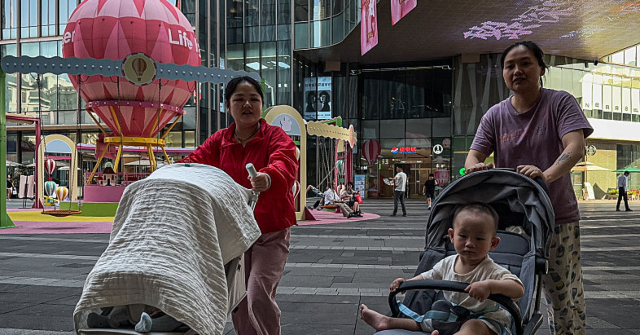The municipal government of Beijing on Thursday rolled out the latest effort to reverse China’s demographic decline, a 15-step plan to create a more “birth-friendly society.”
China’s state-run Global Times reported the 15 measures include more insurance coverage for labor, stronger “birth service support,” enhanced child care, and “supportive childcare policies.”
Most of these policies seem designed to make young couples less fearful of the costs they would incur by getting pregnant:
Among the 15 measures, the city will establish and implement a childcare subsidy system, and effectively enforce policies such as special additional deductions for personal income tax for childcare of children under 3 years old and for children’s education.
The city will strengthen the research and application of reproductive healthcare technologies, enhance the quality of prenatal examinations, hospital deliveries, and postpartum care, and improve mental health services for pregnant and postpartum women, according to the notice.
The measures also include reasonably determining the pricing level for obstetric services, including labor pain relief and assisted reproductive technology services in medical insurance coverage, and timely adjusting medical insurance payment policies. The city will also strengthen education on puberty and sexual health for adolescents.
Sex education has been a fraught topic in China. Even as the Communist government grows more concerned about demographic collapse, it is still reluctant to offend traditional beliefs or alienate parents by compromising the sexual modesty of Chinese culture. Chinese schools are short on teachers who are willing and qualified to teach sex ed.
In addition to Beijing’s 15-point plan, the Global Times noted that China’s central government is setting aside about $12.6 billion for childcare subsidies, and regions like Mongolia are offering their own subsidy programs, especially for first-time parents.
On Monday, the Chinese government announced an annual childcare subsidy of about $500 for children up to age three.
The subsidy, touted as an “important national livelihood policy” by China’s National Health Commission, was clearly a response to flagging birth rates caused by economic anxiety. Skeptics said the subsidy amount was too small to have much of an impact on birth rates, even when combined with provincial and municipal subsidies.
The China-based YuWa Population Research Institute recently published a study showing China is one of the most expensive places in the world to raise a child, with a total price tag over over $75,000 to care for children up to age 17 — a hefty price tag given that the average salary is less than $17,000 in cities, and even lower in rural areas.
Urbanization is a factor China has not fully considered in its efforts to revive flagging birth rates, although Beijing’s 15-step package of subsidies could indicate a change in official thinking.
China’s population has been urbanizing rapidly, and living in cities is far more expensive than living in the country. This resulted in waves of young people at the dawn of their careers — and the prime of their fertility — who viewed children as an impossibly expensive luxury. Chinese studies show the fertility rate in cities is much lower than in rural areas, especially in the most rapidly-growing and expensive cities.
Read the full article here


